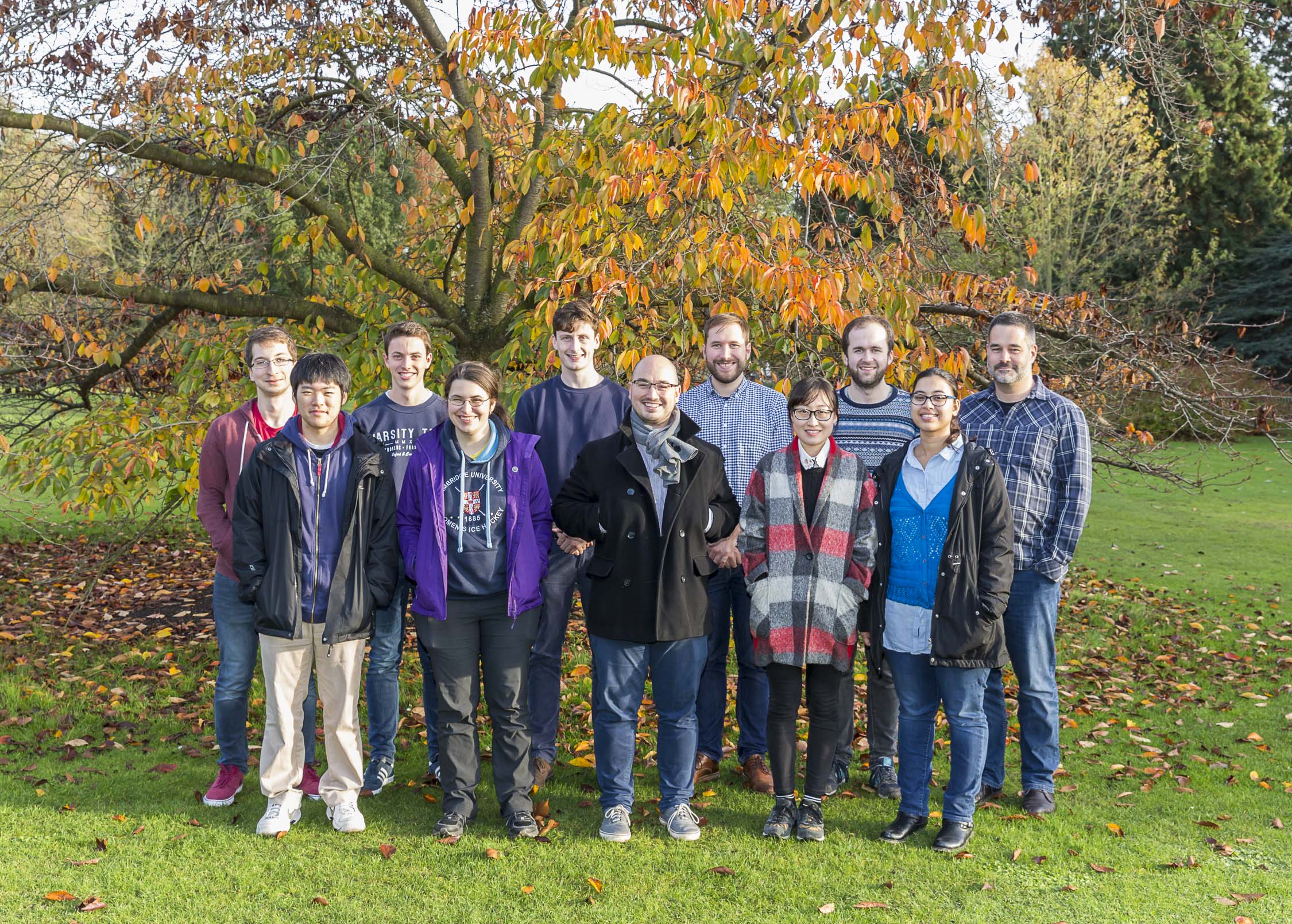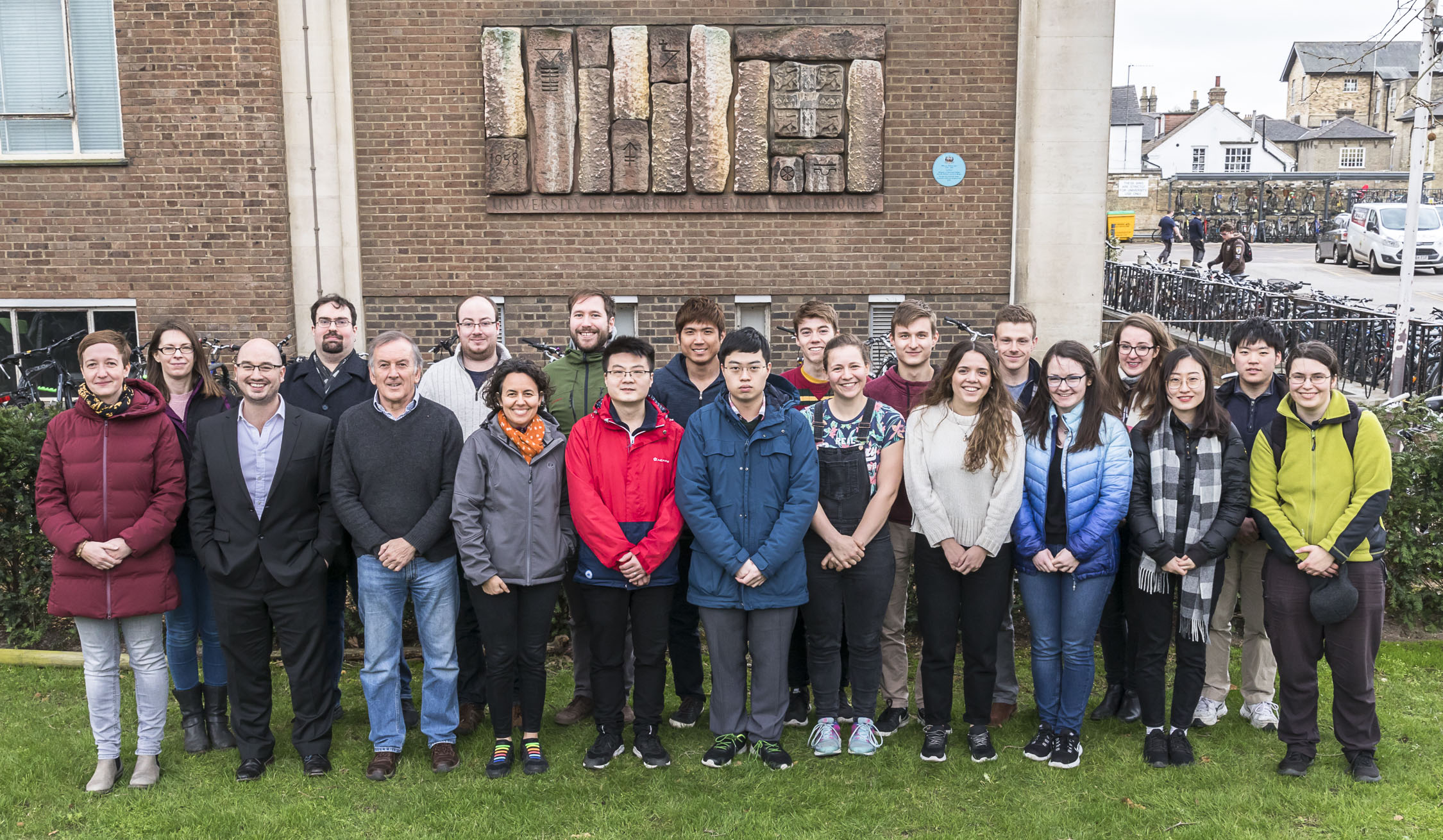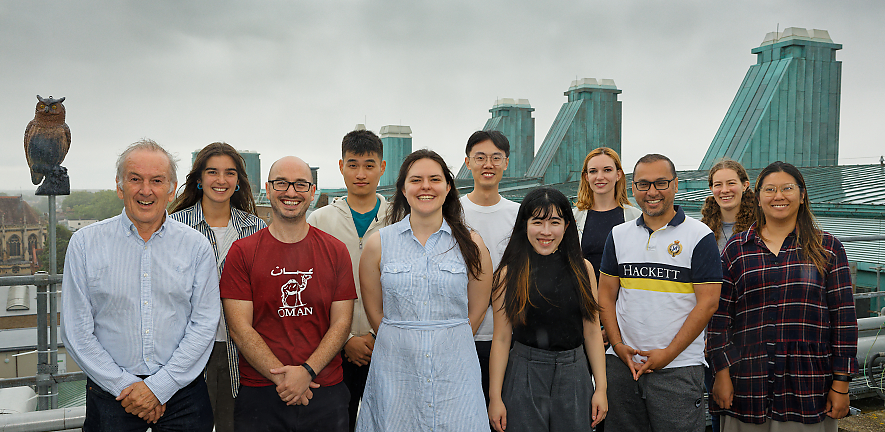
Professor of Atmospheric Chemistry
The chemistry of the Atmosphere
The chemistry of the gases and particles present in the air around is hugely important area of research. We require a detailed understanding of atmospheric chemistry to enable new pathways to reduce air pollution and climate change. To study this topic requires an approach that combines fundamental laboratory studies on the physico-chemical properties of atmospheric constituents with observations of the abundance and variability of these moities and numerical model simulations that integrate our understanding of the sources and fate of these compounds and with which we can test hypothesis on how they will change under different conditions. In the Archibald team we combine these three approaches to enhance our understanding of the air around us.
PhD Projects for 2026 entry
We are currently considering students to join the team from October 2026. The projects we are interested in working on include those focused on understanding the impacts of chemical mechanisms in the atmosphere, atmospheric chemistry climate interactions and the impacts of future climate change on air quality. We are also very happy to take students ideas and help co-develop these.
New -- we are also excited to offer a project through the LCLU this year on "Constraining uncertainty in atmospheric chemistry on Mars":
https://www.lclu.cam.ac.uk/research-proposals-2026
Dr Archibald discusses his research
The Archibald Team
We are a diverse team of researchers interested in improving the understanding of what goes on in the atmosphere.
2017-2018
2018-2019 with members of the Schmidt team and the Pyle team.
2019-20 with members of the Schmidt Team and Pyle Team.
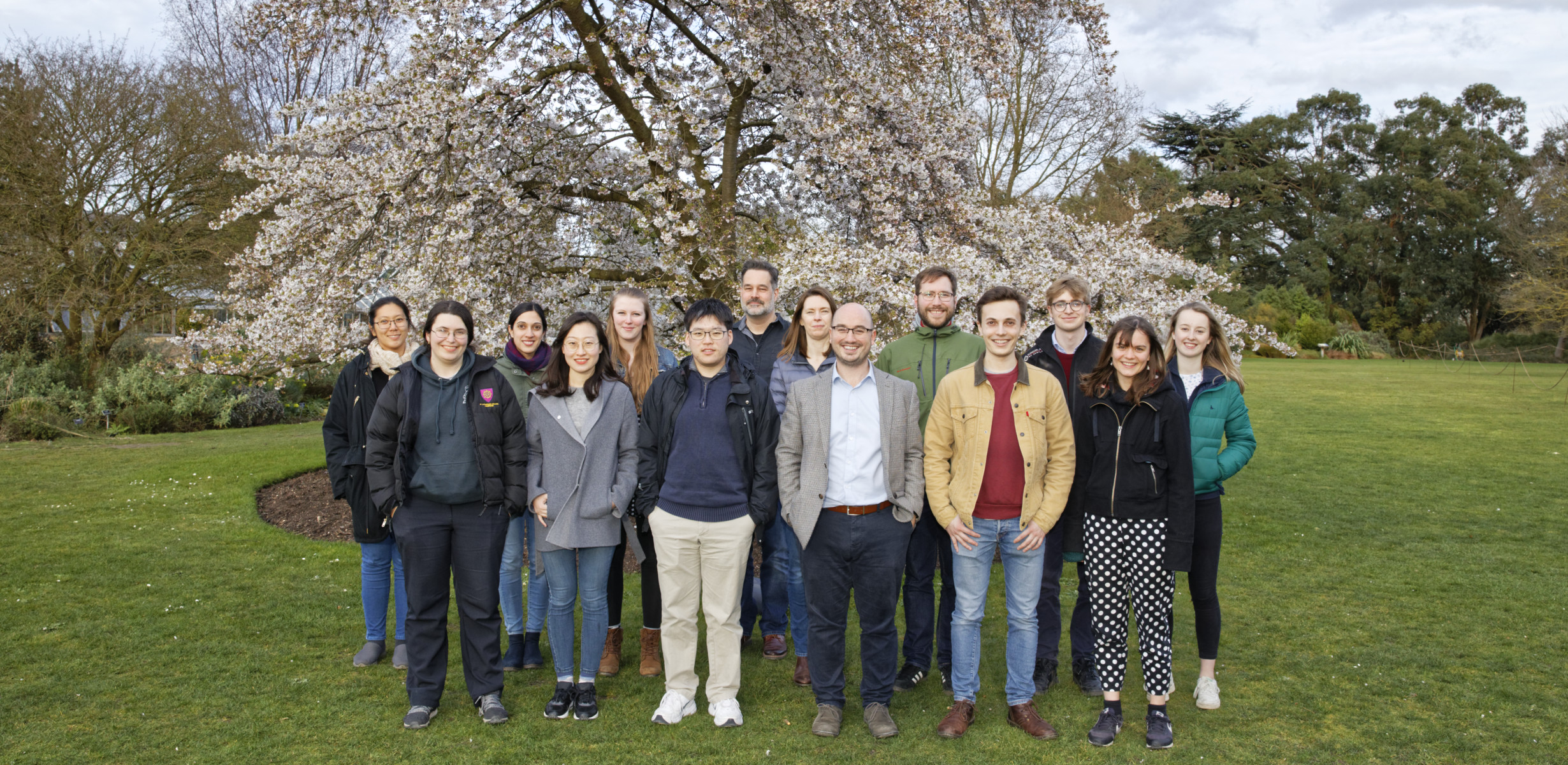
2022
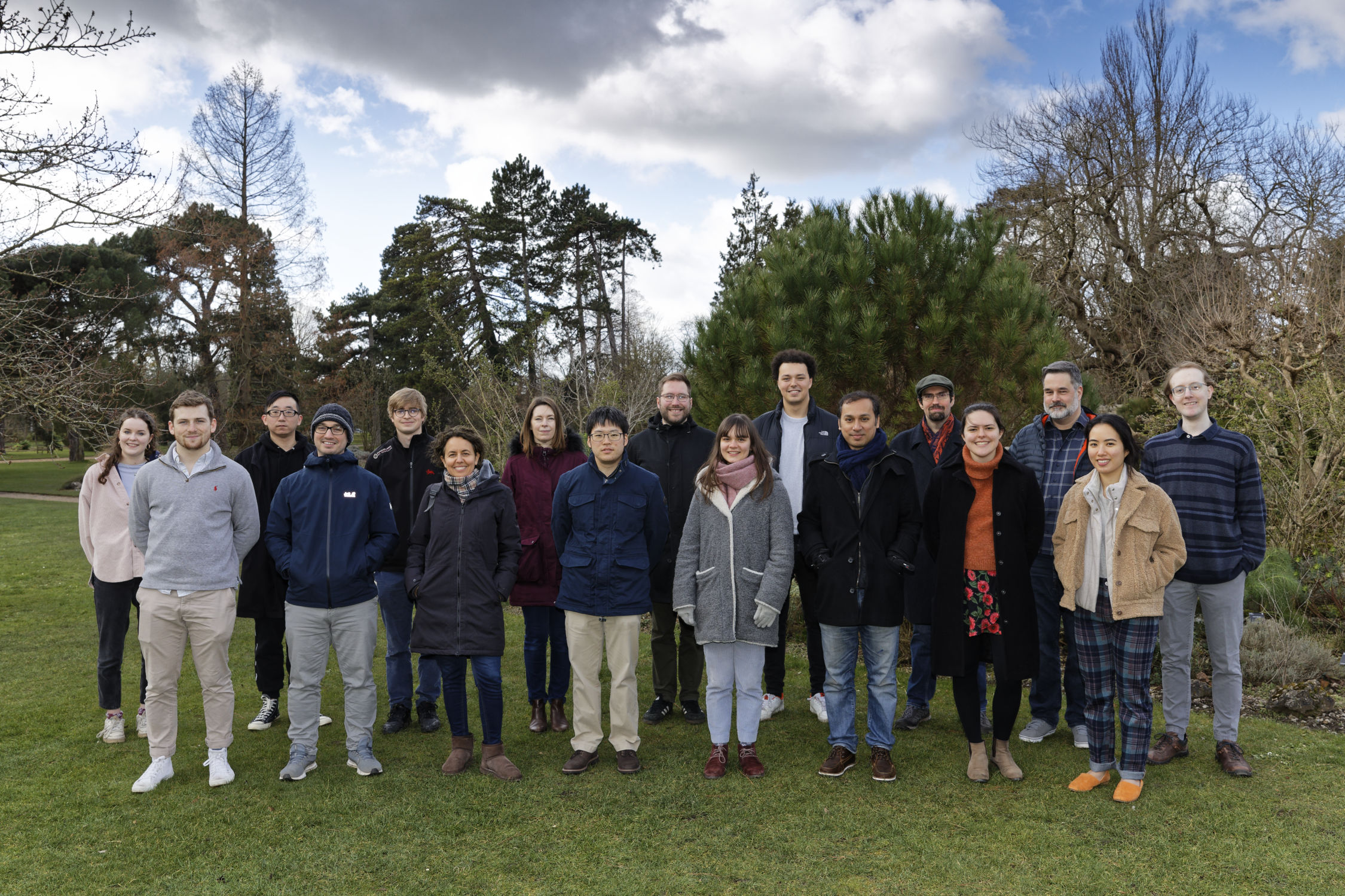
2024
PhD Students
Zainab Hakim --
Michelle Wan --
Matthew Shin --
Andrea Chlebikova -- SOAR3
Co-Supervised:
Omer Nivron --
Risa Ueno -- Improving predictions of future urban temperature extremes for improved energy demand.
Former students:
Lorrie Jacob --
Seb Hickman --
Zosia Staniaszek -- Future Methane
Xingpei Ye -- Visiting from Peking University
Wentai Zhang -- Visiting from Hong Kong University
Jason Sun -- Improved estimates of the air pollution impacts on human health
Le Yuan -- Improving Air Quality for Beijing
James Weber -- Chemistry Climate Feedbacks in the Earth System.
Ben Cala -- Improving the representation of DMS chemistry in UKCA. 2020-2021.
Johnny Staunton-Sykes -- Volcanic Halogens
David Wade -- Paleo Composition Climate Interactions.
MPhil Students (past and present):
Owen Graham -- Studying the aviation impacts of conflict
Isabella Dressel -- Modelling the climate impacts of the hydrogen economy
Selena Zhang -- Earth system impacts of near term climate overshoots.
Lihang Pan -- A tale of two cities: Ozone trends and impacts in Beijing and New Delhi. 2019-2020.
PostDocs and Research Assistants
Current:
Print Sakulsupich -- TWISTA/InHALE
Charlie Wartnaby -- REVEAL-NOx
Rob Waters -- NCAS-Climate
Luke Abraham -- NCAS-Climate
Maria Russo -- NCAS-Climate
Nicola Warwick -- NCAS-Climate
Megan Brown -- Is there life on Mars? (LCLU)
Former:
Xu-Cheng He -- Independent Fellowship, Helsinki, Finland.
Paul Griffiths -- Lecturer at the University of Bristol
James Keeble -- Lecturer at Lancaster University
Part III Students/Summer students
2025-2026
Joanna Baylis
Sean Leong
Amir Rupani
2024-2025
Max Roberts -- Modelling methane chemistry feedbacks
Sam Webber -- Mars modelling
Anna Leow -- Modelling the fate and transport of DMS in the North Atlantic
Amir Rupani -- Modelling the NABLEX campaign 20 years on. What have we learned?
Rohan Agarwal -- Iron salt aerosol, a safe way to remove methane?
Vatsal Kabra -- Air pollution in Delhi: Easy wins through NOx or VOC control?
2023-2024
James Perman --
Ben Harvey -- Constraining Uncertainty In Natural Aerosols Climate Impacts
Robbie Matthews -- Assessing the Prediction of the Distribution of Atmospheric DMS and HPMTF above the North Atlantic Ocean
2022-2023
Alex Mason -- Assessing UKESM1 modelled tropospheric ozone using FAAM aircraft campaign data
Arsen Ismagilov -- Investigating the relationship between ozone and atmospheric blocking
Olivia Hooke -- Investigating the impact of a hydrogen economy on atmospheric chemistry and climate
2021-22
Douglas Russel -- Attributing the role of aerosols and ozone precursors on the tropospheric ozone budget.
Joanne Bell -- Arctic stratospheric ozone trends and causes.
Daniel Winter -- NAO-surface ozone correlations.
2020-21
Hannah Bryant -- Arctic ozone holes: Frequency, causes and impacts.
Ioana Doran -- ACSIS: Impacts of fires on the North Atlantic.
Shengxian Ke -- The impacts of COVID-19 on global tropospheric ozone.
Matt Wright -- Reconciling the budget of ozone in the troposphere.
2019-20
Imogen Lever -- The potential air quality and climate impacts of a future hydrogen economy
Seb Hickman -- Simulating the chemistry of OH in the free troposphere: Simple models and machine learning
Tom Elgar -- Biosignatures as a sign of life? Modelling isoprene chemistry on exoplanets.
Emilia O'Reilly -- The impacts of the Asian Summer Monsoon on atmospheric chemistry and transport.
2018-19
Rachel Allen -- Trends in the NO3 radical: 1850-2100.
Molly Harte -- Geoengineering: Solutions and impacts
Alice Cozens -- Geoengineering: Solutions and impacts
Jack Entwistle -- Evaluation of ATom aircraft campaign data in comparison to UKCA model
Domas Kalvaitis -- Can an exopllanet model simulate the chemistry of Earth?
2017-18
Matthew Shin -- Evaluating trends in tropospheric ozone over the UKCA model
Tom Surrall -- Evaluation of emission inventories of VOCs over India
Alec Granville-Willet -- Evaluation of Archean atmosphere HCHO photochemistry
Research Interests
Our research involves the development and application of state-of-the-art chemistry-climate models. With these models we are trying to answer a number of questions relevant to society: (i) What are the impacts of changes in man made emissions on the composition of the atmosphere (ii) how does the changing composition of the atmosphere affect climate (iii) how will a changing climate impact the composition of the atmosphere.
There are three main areas of research within the group:
- Understanding the fundamentals of gas phase chemistry in the atmosphere
- Understanding the impacts of changes in gases and particles on climate
- Understanding the impacts of changes in climate on gases and particles
Current funded projects
REVEAL-NOx: Reducing aviation Emissions' uncertain climate impacts: NOx
Constraining the role of the marine sulfur cycle in the Earth System (CARES)
Direct Studies of Peroxy Radical Autoxidation Reactions
TWISTA (The Wide-ranging Impacts of STratospheric smoke Aerosols)
Investigating HALocarbon impacts on the global Environment (InHALE)
Completed projects
Topic A. Hydrogen Emissions: Constraining The Earth system Response (HECTER)
The North Atlantic Climate System Integrated Study: ACSIS
Oxidant Budgets of the Northern Hemisphere: OXBUDS
Process analysis, observations and modelling - Integrated solutions for cleaner air for Delhi: PROMOTE
You can find out more about ACSIS and the work we do in our group by watching this video here (many thanks to Dr Steven Lee!).
Completed projects
Specific projects have included:
- The mechanisms of oxidation of biogenic hydrocarbons
One of the main areas of research in my group is trying to better understand the mechanisms of oxidation of biogenic hydrocarbons - in particular the oxidation of isoprene. Isoprene enters the atmosphere via emissions from plants and trees. Every year a mass roughly equal to that of the entire human population is emitted into the atmosphere! Owing to this, and its high reactivity, it is paramount to include isoprene chemistry in chemistry-climate models. However, the details of the chemistry vary wildly between models and isoprene chemistry has been suggested as a major cause of disagreement between model predictions of secondary pollutants. The figure below highlights some of the chemistry of isoprene oxidation initiated by the hydroxyl radical.
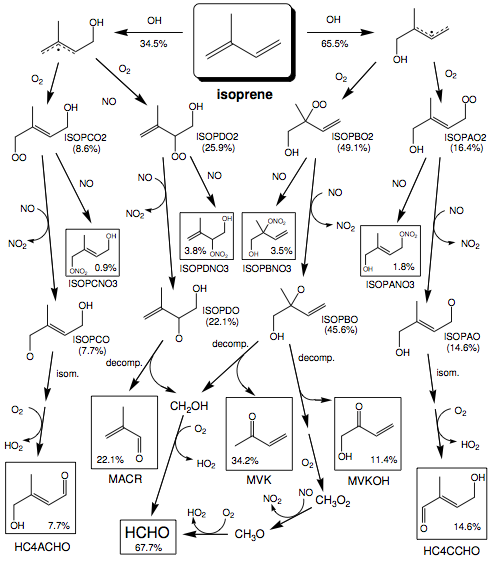
- The impacts of fracking on air quality
In collaboration with the Met Office our group have also looked at the role of fracking in the UK, and the impacts of unconventional hydrocarbon extraction on air quality. For this work we use a version of the Met Office weather forecast model modified for simulating air pollution. The animation below shows the domain this model covers and the simulated levels of the pollutant ozone (O3) from the model.

- Long range transport of trace gases
Gases that have lifetimes against chemical reaction in the atmosphere greater than a few days can be transported over great distances. The animation below shows how the ozone depleting substance methyl chloride (CH3Cl) can be emitted from fires in Brazil and transported over several days and 100s of km across South America. Daily average observations of CH3Cl recorded at the AGAGE monitoring site in Barbados are plotted below the animation and you can see that there are several periods where "spikes" are seen in these data. We try to understand both the roles of atmospheric transport and chemistry over these long ranges to answer questions such as how will changes in emissions downwind of us impact the quality of the air we bretahe?
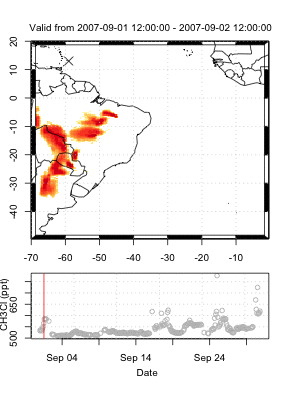
For more information about the groups published work see my publications below and my Google scholar page.
For more information about my work check out my ORCID profile.
Teaching
1A Kinetics of Chemical Reactions
1B Quantitative Environmental Science
Part II Chemistry in the Atmosphere.
Part III IDP1
Software
For those interested in looking at some simple numerical problems concerning atmospheric chemistry, feel free to have a play with this simple R script: https://bitbucket.org/alex_archibald/atmos_chem_model
Publications
- Page 1

